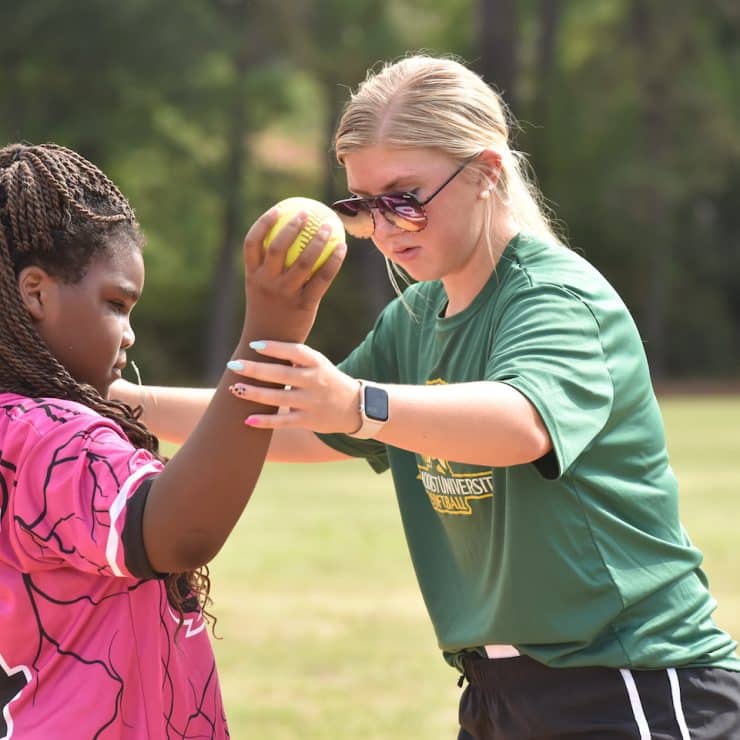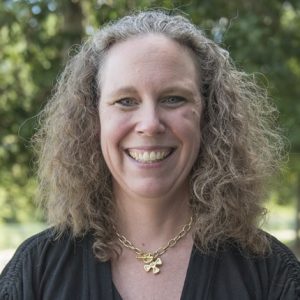
Physical Education & Health Education
Graduates with a major in Physical Education and Health Education (PHE) will have the skills and knowledge necessary to become effective Physical Education and Health Education teachers. Students who earn a major in physical education and health education, with teacher licensure, are qualified to teach physical education and health education in grades K-12 in North Carolina and many other states. North Carolina currently has reciprocity with approximately 45 other states which typically allows our graduates to be eligible for immediate employment in those states. After successfully passing appropriate licensure tests and completing some additional coursework, graduates frequently gain employment in the remaining states.
The Teacher Education Program, with which the Physical Education & Health Education major is associated, requires students to participate in three different field experiences prior to student teaching. Since North Carolina licensure in Physical Education & Health Education is for grades K-12, Physical Education & Health Education majors in the Teacher Education Program complete a field experience in each of three settings: an elementary school, a middle school, and a high school. Students are allowed to choose the setting in which they complete their full-semester student teaching experience.
Most field experiences take place in the Cumberland County School System, which provides a quality education to over 54,000 students. Cumberland County has over 30 elementary schools, over 10 middle schools, and seven high schools with more schools currently under construction. Students may also choose to do their field experiences and student teaching with the Fort Liberty School System, which is part of the Department of Defense, and nearby communities such as Hoke, Harnett, and Johnston counties. Students are supervised on-site by their cooperating teacher and by a Methodist University Physical and Health Education, or Education Department faculty member.
Common Career Paths
Some of the top jobs for those with a Physical Education & Health Education bachelor degree include athletic trainer, health and wellness coordinator, recreation and fitness studies teacher, coach, and so much more.
Common Salary Ranges for Graduates
As mentioned above, there’s a long list of career opportunities for those with a Physical Education & Health Education degree. But, the U.S. Bureau of Labor Statistics reports the average annual salary for the following positions (which may require additional education) in North Carolina in 2021:
- Athletic trainer: $49,260
- Health education specialist: $55,220
- Recreation and fitness studies teacher: $67,800
- Coach and scout: $49,940
Average Tuition Cost
The average cost for an incoming residential freshman to attend MU is less than $18,000 – similar to the cost of attending one of the big-box public schools, but with the enhanced value of a highly-regarded private school with a 12:1 student-to-faculty ratio.
While tuition varies, depending on a student’s financial aid package, it’s important to know that the average financial award for an incoming residential freshman at MU is more than $34,000.
Financial Aid & Scholarships
More than 97% of MU students receive some form of financial aid, with the University offering more than $24 million annually to students for scholarships. If a student is active military, family of active military, or a veteran, they may also qualify for MU’s military education benefits.
Interested in Methodist University’s Physical Education & Health Education program?
If you have questions, reach out to Dr. Patricia Fecher using the contact info at the bottom of the page. If you’re ready to apply today, click the button below!
Frequently Asked Question
No, Methodist University does not offer its Physical Education & Health Education degree online. However, the University’s on-campus program will best prepare you for a career in the field.
Major Requirements
The Physical Education and Health Education major consists of 68 credits and is distributed as follows:
Content Course Requirements
45 credits
| KIN 2050 Introduction to Physical Education and Health Education (4) | KIN 3050 Measurement and Evaluation (3) |
| KIN 2090 Sport Pedagogy I (3) | KIN 3060 Adapted Physical Education (3) |
| KIN 2150 Research Seminar (2) | KIN 3100 Health Related Physical Assessment (3) |
| KIN 2200 Computer Applications in Physical Education and Health Education (3) | KIN 3200 Motor Development (3) |
| KIN 2400 Human Nutrition (3) | KIN 3300 Behavior Management in Physical Education and Health Education (3) |
| KIN 2860 Foundations of Physiology (3) | KIN 3400 Sport Pedagogy II (3) |
| KIN 2900 Structural Kinesiology (3) | KIN 4060 Adapted Physical Education Practicum (3) |
| KIN 3040 Physiology of Exercise (3) |
Teacher Professional Licensure
23 credits
Students must earn a final grade of C or better in all courses with an EDU or SPE prefix.
| EDU 2420 Field Experience II (1) | EDU 4130 Methods for Physical & Health Education (3) |
| EDU 3300 Educational Psychology (3) | EDU 4200 Reading & Writing in the Content Areas (6-8, 9-12) (3) |
| EDU 3420 Field Experience III (1) | *EDU 4210 Student Teaching (10) |
| EDU 4070 Professional Orientation (2) |
Licensure Testing Requirements
0 credits
| ETS Praxis I Core Academic Skills Test for Educators or requisite ACT/SAT passing scores (test codes: 5713, 5723, 5733, or combined test code: 5752) | ETS Performance Assessment (PPAT) |
| Praxis II, Physical Education and Health Education (test code: 5857) |
A final grade of B or better is required in Student Teaching to apply for a North Carolina Teacher License.
Minor Requirements
The Physical Education and Health Education minor consists of 22 credits and is distributed as follows:
| KIN 2050 Introduction to Physical Education and Health Education (4) | KIN 3200 Motor Development (3) |
| KIN 2200 Computer Applications in Physical Education and Health Education (3) | KIN 3300 Behavior Management in Physical Education and Health Education (3) |
| KIN 3060 Adapted Physical Education (3) | KIN 4060 Adapted Physical Education Practicum (3) |
| KIN 3100 Health Related Physical Assessment (3) |
NC State Board of Education Complaint Process
The North Carolina State Board of Education (SBE) has jurisdiction to investigate allegations of noncompliance regarding specific laws and rules. Complaints may address Educator Preparation Program requirements set forth in Article 15(D) of Chapter 115C. The SBE does not have jurisdiction over complaints related to contractual arrangements with an EPP, commercial issues, obtaining a higher grade or credit for training, or seeking reinstatement to an EPP. All complaints filed with the SBE must be in writing. A person or entity may file a written complaint with SBE by filling out a complaint form and submitting online and/or mailing or faxing a hard copy to the address on the form.
Contact
Patricia Fecher, Ed.D.

